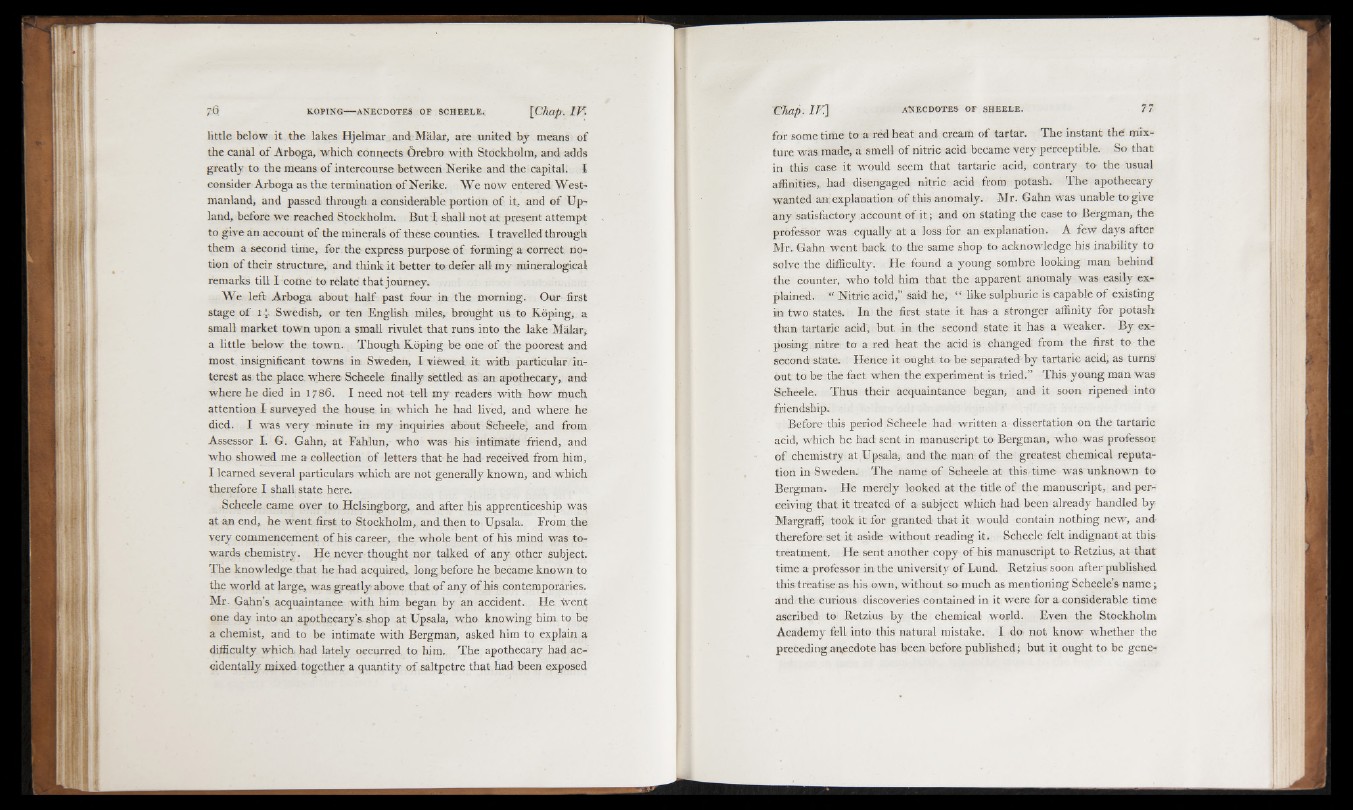
little below it the lakes Hjelmar and Malar, are united! by means of
the canal of Arboga, which connects drebro with Stockholm, and adds
greatly to the means of intercourse between Nerike and the capital. I
consider Arboga as the termination of Nerike. We now entered West-
manland, and passed through a considerable portion of it, and of Upland,
before we reached Stockholm. But I shall not at present attempt
to give an account of the minerals of these counties. X travelled through
them a second time, for the express purpose o f forming a correct, notion
o f their structure, and think it better to defer all my mineralogieal
remarks till I come to relate that journey.
We left Arboga about half past four in the morning. Our first
stage o f 14. Swedish, or ten English miles, brought us to Koping, a
small market town upon a small rivulet tbat runs into the lake Malar,
a little below the town. Though Koping be one of the poorest and
most insignificant towns in Sweden, I viewed it with particular interest
as the place, where Scheele finally settled as an apothecary, and
where he died in 1786. I need not tell my readers with haw much
attention X surveyed the bouse in which he had lived, and where he
died. I was very minute in my inquiries about Scheele, and from
Assessor I. G. Gahn, at Fablun, who was his intimate friend, and
who showed me a collection of letters that he had received from him,
I learned several particulars which are not generally known, and which
therefore I shall state here.
Scheele came over to Helsingborg, and after his apprenticeship was
at an end, he went first to Stockholm, and then to Upsala. From the
very commencement of his career, the whole bent of his mind was towards
chemistry. He never thought nor talked o f any other subject.
The knowledge that he had acquired, long before he became known to.
the world at large, was greatly above that of any of his contemporaries.
Mr. Gahn’s acquaintance with him began by an accident. He went
one day into an apothecary’s- shop at Upsala, who knowing him to be
a chemist, and to be intimate with Bergman, asked him to explain a
difficulty which had lately occurred to him. The apothecary had accidentally
mixed together a quantity of saltpetre that had been exposed
for some time to a red heat and cream of tartar. The instant the! mixture
wais made, a smell of nitric acid became very perceptible. So that
in this case it would seem that tartaric acid, contrary to the usual
affinities, had disengaged nitric acid from potash. The apothecary
wanted an: explanation of this anomaly. Mr. Gahn was unable to give
any satisfactory account of it; and on Stating the case to Bergman, the
professor was equally at a loss for an explanation. A few days after
Mr. Gahn went back to the same shop to acknowledge his inability to
solve the difficulty. He found a young sombre looking man behind
the counter, who told him that the apparent anomaly was easily explained.
Nitric acid,” Said he, “ like sulphuric is capable of existing
in two states. In the first state it has- a stronger affinity for potash
than tartaric acid’, but. in the second state it has a weaker. By exposing
mitre to a red heat the acid is changed from the first to the
second state. Hence it ought to be separated'by tartaric aeid, as turns
out to be the fact when the experiment is tried.” This young man was
Scheele, Thus their acquaintance began, and it soon ripened into
friendship.
Before this period Scheele had written a dissertation on the tartaric
acid, which he had sent in manuscript to Bergman, who was professor,
o f chemistry at Upsala, and the man o f the greatest chemical reputation
in Sweden. The name of Scheele. at this, time was unknown to
Bergman. He merely looked at the tide of the manuscript, and perceiving
that it treated o f a subject which had been already handled by
MargrafF, took it for granted- that it would contain nothing new, and-
therefore set it aside without reading it. Scheele felt indignant at this
treatment. Hie sent another copy of his manuscript to Retzius, at that
time a professor in the university of Lund. Retzius soon after published
this treatise as his own,, without so much as mentioning Scheele’s name;
and the curious discoveries contained in it were for a considerable time
ascribed to Retzius by the chemical world. Even the Stockholm
Academy fell into this natural mistake. I do not know whether the
preceding anecdote has been before published ; but it ought to be gene